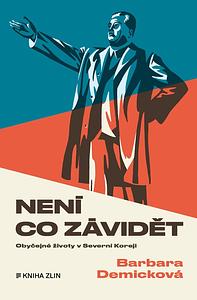You need to sign in or sign up before continuing.
Take a photo of a barcode or cover
dark
emotional
informative
reflective
sad
tense
medium-paced
The use of the phrase ‘ordinary lives’ to describe accounts of commonplace starvation, deprivation, death and hard-won escape really brings it home.
A minor quibble because so much of this is excellent but for a book that provided such a nuanced view of the regime, I found it jarring that the term ‘arrived’ kept getting used to describe North Koreans who’d sufficiently assimilated to South Korean and capitalist culture.
A minor quibble because so much of this is excellent but for a book that provided such a nuanced view of the regime, I found it jarring that the term ‘arrived’ kept getting used to describe North Koreans who’d sufficiently assimilated to South Korean and capitalist culture.
What a fascinating book. It's not often that I am wrapped up enough in a book that I give over most of a Saturday to read it. But I couldn't put this one down.
Barbara Demick is the Beijing bureau chief for the Los Angeles Times and she has spent many years covering both North and South Korea. It's clear she knows the countries and the cultures well and has a deep respect for the people on both sides of the DMZ. It is this respect for her subjects that makes the telling of their stories so compelling.
The title Nothing to Envy is taken from the lyrics of a well-known North Korean children's song extolling the God-like protection of the Great Father, Kim Il-sung, and later his son and successor, Kim Jung-il:
The irony of the lyric is evident throughout the book, as the life histories of six North Koreans unfold--and unravel. Life in North Korea is nothing to envy.
Demick's subjects are not political dissidents or intellectual or artistic refugees who dramatically jumped ship into the arms of a waiting CIA. As the subtitle implies, they were ordinary people living ordinary lives "within the embrace of the Workers' Party." Some were true believers, devoted to the "Father" Kim Il-sung and the Workers' Party; others were apolitical, with aspirations only to a good marriage, a good job and enough food. Mi-ran, daughter of a South Korean POW who was assimilated into North Korean society but is still low, low on the Party totem pole. Mrs. Song, devoted to the Party and one of the neighborhood women who enforced its edicts through peer pressure (or denunciation). Dr. Kim, top of her medical school class, the very model of a Communist worker with strong aspirations to one day be a Party member. Jun-sang, picked to study science at the University in the capital city, on track to be a rising star. While some had nagging questions about the regime, none would have considered leaving North Korea if the severe famine in the late 1990s hadn't forced their hands.
Their intertwined stories are far more gripping and remarkable than all but the best novelists could conjure. And Demick tells them brilliantly, primarily because she slips quietly into the shadows and lets her subjects' stories shine. Need-to-know information about history or politics or culture is woven seamlessly into the narratives.
Aside from a glance at the occasional headline, I've never given much thought to North Korea. I know very little, other than that its dictator is a nutcase who likes brinkmanship and George W. Bush named it part of the "Axis of Evil" following 9/11. What few of us in the West know or can even conceive is the devastation of its people. For most of the day, its towns do not have electricity, not for lack of infrastructure but because the government cannot keep the power plants running. During the famine, which has never fully lifted, food was so sparse that people picked blades of grass or extracted undigested corn from their own feces just to have something to put in their stomachs. Without Internet or many cell phones, its population is isolated in ways that don't augur well for a Egyptian-like revolution any time soon.
Barbara Demick is the Beijing bureau chief for the Los Angeles Times and she has spent many years covering both North and South Korea. It's clear she knows the countries and the cultures well and has a deep respect for the people on both sides of the DMZ. It is this respect for her subjects that makes the telling of their stories so compelling.
The title Nothing to Envy is taken from the lyrics of a well-known North Korean children's song extolling the God-like protection of the Great Father, Kim Il-sung, and later his son and successor, Kim Jung-il:
Our father, we have nothing to envy in the world.
Our house is within the embrace of the Workers' Party.
We are all brothers and sisters.
The irony of the lyric is evident throughout the book, as the life histories of six North Koreans unfold--and unravel. Life in North Korea is nothing to envy.
Demick's subjects are not political dissidents or intellectual or artistic refugees who dramatically jumped ship into the arms of a waiting CIA. As the subtitle implies, they were ordinary people living ordinary lives "within the embrace of the Workers' Party." Some were true believers, devoted to the "Father" Kim Il-sung and the Workers' Party; others were apolitical, with aspirations only to a good marriage, a good job and enough food. Mi-ran, daughter of a South Korean POW who was assimilated into North Korean society but is still low, low on the Party totem pole. Mrs. Song, devoted to the Party and one of the neighborhood women who enforced its edicts through peer pressure (or denunciation). Dr. Kim, top of her medical school class, the very model of a Communist worker with strong aspirations to one day be a Party member. Jun-sang, picked to study science at the University in the capital city, on track to be a rising star. While some had nagging questions about the regime, none would have considered leaving North Korea if the severe famine in the late 1990s hadn't forced their hands.
Their intertwined stories are far more gripping and remarkable than all but the best novelists could conjure. And Demick tells them brilliantly, primarily because she slips quietly into the shadows and lets her subjects' stories shine. Need-to-know information about history or politics or culture is woven seamlessly into the narratives.
Aside from a glance at the occasional headline, I've never given much thought to North Korea. I know very little, other than that its dictator is a nutcase who likes brinkmanship and George W. Bush named it part of the "Axis of Evil" following 9/11. What few of us in the West know or can even conceive is the devastation of its people. For most of the day, its towns do not have electricity, not for lack of infrastructure but because the government cannot keep the power plants running. During the famine, which has never fully lifted, food was so sparse that people picked blades of grass or extracted undigested corn from their own feces just to have something to put in their stomachs. Without Internet or many cell phones, its population is isolated in ways that don't augur well for a Egyptian-like revolution any time soon.
Absolutely fascinating book about North Korea told from a journalist who had visited there and interviewed North Korean defectors in South Korea about their experience.
emotional
hopeful
informative
reflective
sad
fast-paced
GW Bush once said something along the lines of how history will be the ultimate judge. History will not look kindly on his Iraq BS and will probably be harsher on how North Korea was allowed to exist as it currently does.
I did feel this book felt like it was written for a magazine series. We are constantly reminded of information even though we were previously given the information only a few pages previously. Even though the story switches often between several people, it wasn't confusing enough to warrant constant reminders.
Also, many of the people seem to remember a lot of details from many years ago despite not daring to have a diary. It's plausible for big events but not some of the day to day ones, especially in their starved almost delirious state for some.
It's an interesting, depressing, yet hopeful read. It's hard not to be drawn into the lives of the defectors and feel their pain. But the ones interviewed for the book ultimately lucked out and worked hard and it's hard not to respect what they were able to endure and accomplish.
I did feel this book felt like it was written for a magazine series. We are constantly reminded of information even though we were previously given the information only a few pages previously. Even though the story switches often between several people, it wasn't confusing enough to warrant constant reminders.
Also, many of the people seem to remember a lot of details from many years ago despite not daring to have a diary. It's plausible for big events but not some of the day to day ones, especially in their starved almost delirious state for some.
It's an interesting, depressing, yet hopeful read. It's hard not to be drawn into the lives of the defectors and feel their pain. But the ones interviewed for the book ultimately lucked out and worked hard and it's hard not to respect what they were able to endure and accomplish.
hopeful
informative
slow-paced
Fascinating content but could have done with one more set of fresh eyes for editing. Lots of repetition of specific incidents or facts and the pre-escape of North Korea plot lines felt meandering as she navigated among the defectors’ stories.
dark
funny
informative
sad
tense
slow-paced
Even before I was halfway through this book, I was telling people to read it. This little glimpse into the lives of North Koreans during the 1990s and early 2000s was eye-opening and disturbing. I can't believe how successful North Korea has been in cutting off its people from the rest of the world and vice versa. Demick has put together a work that is both informative and engaging; the breadth of her research is incredible. Even after reading this book, it is so hard to wrap my mind around the fact that this crazy dystopian land is a real place where real people live. Truly stranger than fiction and morbidly fascinating.
The book only takes the reader up through the early/mid-2000s, so I'm interested to know what impact, if any, the death of Kim Jong-il and the subsequent rise of Kim Jong-un has had on the country. And, I'd like to know if the number of North Koreans that defect on a yearly basis has changed since the mid-2000s.
The book only takes the reader up through the early/mid-2000s, so I'm interested to know what impact, if any, the death of Kim Jong-il and the subsequent rise of Kim Jong-un has had on the country. And, I'd like to know if the number of North Koreans that defect on a yearly basis has changed since the mid-2000s.




